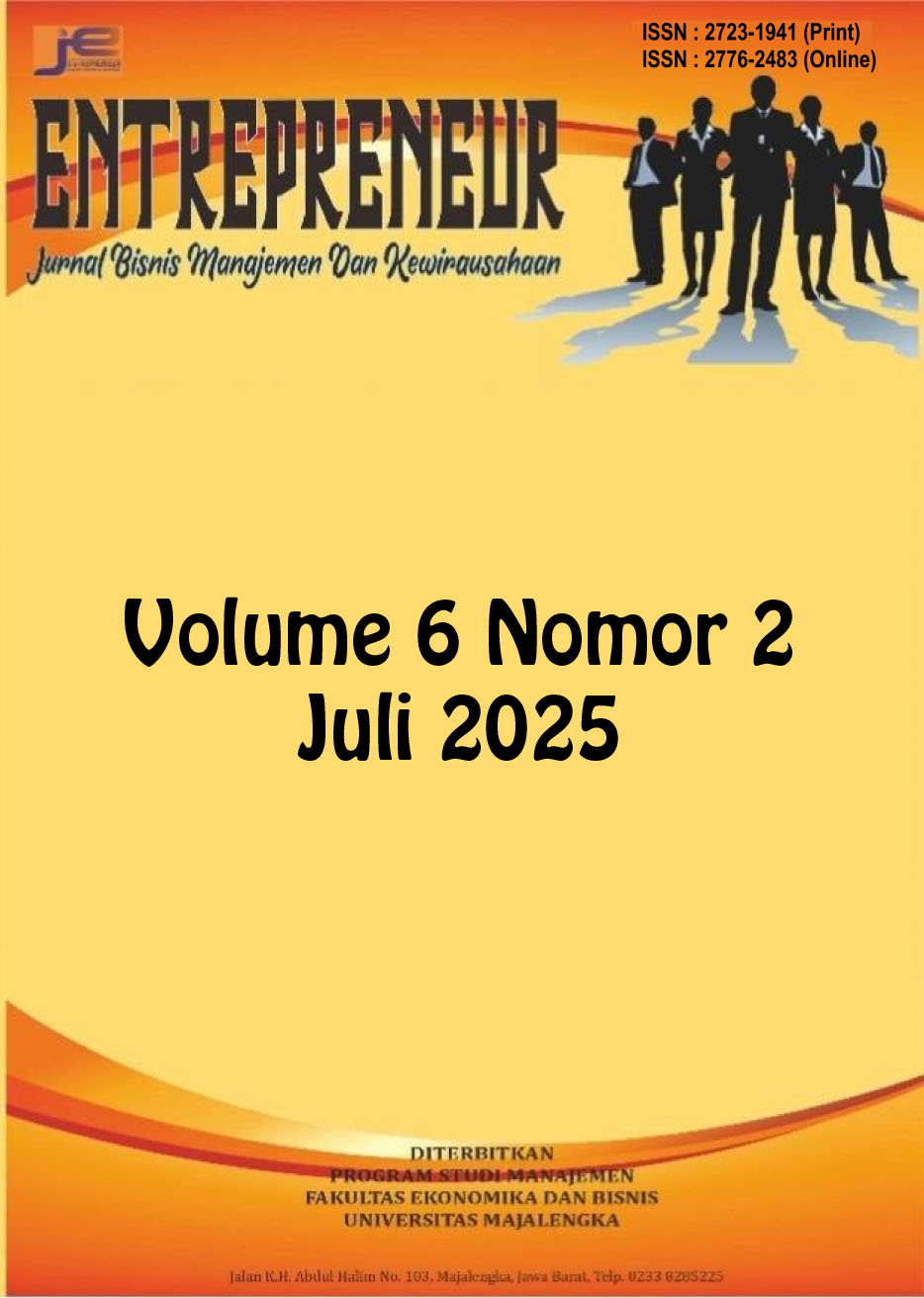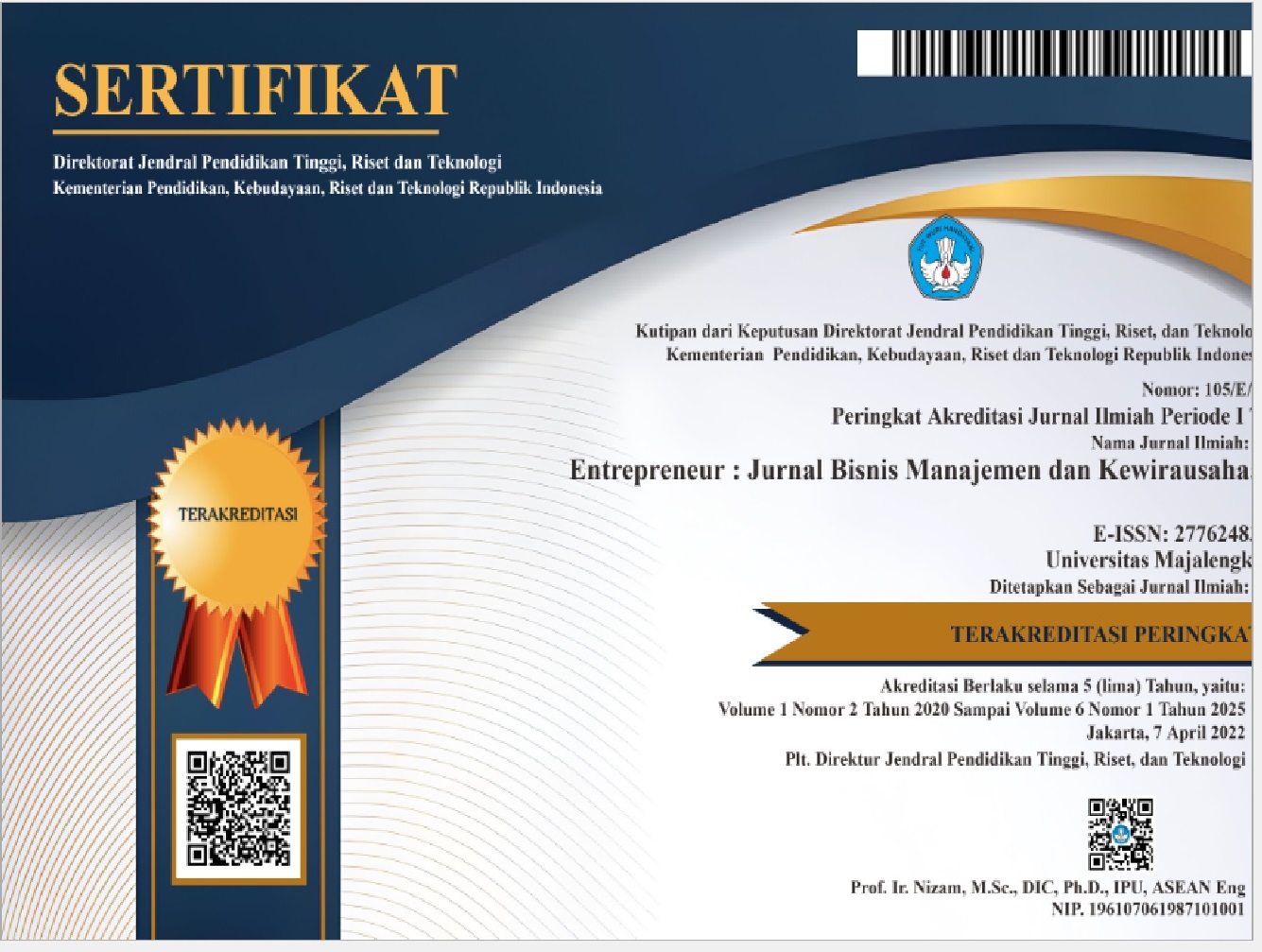Hubungan EMS dan GSCM pada UMKM Batik sebagai Pilar Sustainable Green Management System
DOI:
https://doi.org/10.31949/entrepreneur.v6i2.15320Abstract
The purpose of this research is to explore the relationship between environmental management system and green supply chain management as a complement to the sustainable green management system empirically and practically in the Kusuma batik community of Pekalongan City. The type of research is a quantitative research with a survey method using a questionnaire with saturated sampling techniques. The population is 32 batik MSMEs who are members of the Kusuma batik village association and have carried out environmentally friendly practices. The results of the study were obtained that there is a positive and significant influence between the environmental management system on sustainability, there is a positive and significant influence between green supply chain management on sustainability, and the exploration of the relationship between environmental management system and green supply chain management in batik MSMEs can be a complement to the sustainable green management system/green supply chain management both empirically and practically in the Kusuma batik community The city of Pekalongan will have an impact on sustainability in three aspects, namely economic, environmental and social. EMS is able to improve the performance of the organization's environment, so that it needs to be adopted, in addition to EMS also needs to facilitate the implementation of green supply chain management and institutional pressure because both are sustainable green management practices.
Keywords:
environment management system, green supply chain management, sustainable green management systems, Batik MSMEsDownloads
References
Agarwal A., Giraud-carrier, F. and Li, Y. (2018). A Mediation Model of Green Supply Chain Management Adoption: The Role of Internal Impetus. International Journal of Product Economics, 2018, doi: 10.1016/j.ijpe.2018.09.011.
Artaya, I. P., Kamisutara, M., & Baktiono, R. A. (2018). Pengaruh Citra Produk Berdasarkan Analisis Persepsi Konsumen Pada Kelompok Usaha Aneka Pangan Kota Sidoarjo. Jurnal Ilmiah Tata Sejuta STIA Mataram, 4(1), 39-50.
Bansal P, Hunter T. (2003). Strategic explanations for the early adoption of ISO 14001. Journal of Business Ethics 46: 289–299.
Barber, K. D., Garza-Reyes, J. A., Kumar, V., & Abdi, M. R. (2017). The effect of supply chain management practices on supply chain and manufacturing firms’ performance. Journal of Manufacturing Technology Management.
Chien, M. K., & Shih, L. H. (2007). An empirical study of the implementation of green supply chain management practices in the lectrical and electronic industry and their relation to organizational performances.
Dinas Koperasi dan UMKM DIY (2020). Data UMKM DIY 2019. Ellinger, A. E. (2000). Improving marketing/logistics cross-functional collaboration in the supply chain. Industrial marketing management, 29(1), 85-96.
Ferenhof, H. A., Vignochi, L., Selig, P. M., Lezana, Á. G. R., & Campos, L. M. (2014). Environmental management systems in small and medium-sized enterprises: an analysis and systematic review. Journal of Cleaner Production, 74, 44-53.
Fidakusuma, G. N. (2013). Perilaku Sosial Anak Tunarungu Tingkat SMP di SLB BC Pambudi Dharma II Kota Cimahi: Studi Deskriptif Kualitatif pada Siswa Tunarungu SMPLB di SLB B-C Pambudi Dharma II-Cimahi (Doctoral dissertation, Universitas Pendidikan Indonesia).
Firmandani, F. (2019). PENGARUH SUPPLY CHAIN MANAGEMENT (SCM) TERHADAP KINERJA PERUSAHAAN DAN KEUNGGULAN BERSAING SEBAGAI VARIABEL MEDIASI (Studi Pada UKM Tenun di. Desa Gamplong Gamplong Sumberrahayu Moyudan Sleman, Yogyakarta) (Doctoral dissertation, Universitas Islam Indonesia).
Firmansyah, A. I. (2018). Pengaruh pertumbuhan usaha mikro, kecil, dan menengah terhadap pertumbuhan ekonomi di tulungagung.
Gustila T. (2019). Analisis Faktor Pendorong dan Faktor Penghambat dalam menerapkan Inovasi Ramah Lingkungan pada UKM di Indonesia.
Huang, X., Tan, B. L., & Ding, X. (2015). An exploratory survey of green supply chain management in Chinese manufacturing small and medium-sized enterprises. Journal of Manufacturing Technology Management.
Jüttner, U., Christopher, M., & Godsell, J. (2010). A strategic framework for integrating marketing and supply chain strategies. The International Journal of Logistics Management.
Mafini, C., & Loury-Okoumba, W. V. (2018). Extending green supply chain management activities to manufacturing small and medium enterprises in a developing economy. South African Journal of Economic and Management Sciences, 21(1), 1-12.
Mafini, C., & Muposhi, A. (2017). The impact of green supply chain management in small to medium enterprises: Cross-sectional evidence. Journal of Transport and Supply Chain Management, 11(1), 1-11.
Maghfiroh, M., Sunarjo, W. A., Sasongko, A. D. W., Oktaviani, N., Ristiawati, R., Hanifah, F. T., & Fadhilah, W. K. (2023). Pengaruh Tingkat Pengetahuan Industri Batik Menuju Industri Hijau sebagai Bentuk Tanggung Jawab Sosial pada Keberlanjutan Lingkungan. Pena: Jurnal Ilmu Pengetahuan dan Teknologi, 37(2), 157-166.
Musianto, L. S. (2004). Perbedaan pendekatan kuantitatif dengan pendekatan kualitatif dalam metode penelitian. Jurnal Manajemen dan kewirausahaan, 4(2), pp-123.
Niode, I. Y. (2009). Sektor UMKM di Indonesia: Profil, masalah, dan strategi pemberdayaan. Jurnal kajian ekonomi dan bisnis OIKOS-NOMOS, 2(1), 1- 10.
Peglau R. (2005). ISO 14001 Certification of the World. Federal Environmental Agency: Berlin.
Prasetyo, P. E. (2008). Peran usaha mikro kecil dan menengah (umkm) dalam kebijakan penanggulangan kemiskinan dan pengangguran. Akmenika Upy, 2(1), p1-13.
Porter M, van der Linde C. (1995). Green and competitive. Harvard Business Review 73: 120–138.
Purnomo, H., Kisanjani, A., Kurnia, W. I., & Suwarto, S. (2019). Pengukuran Kinerja Green Supply Chain Management Pada Industri Penyamakan Kulit Yogyakarta. Jurnal Ilmiah Teknik Industri, 18(2), 161-169.
Putri, N. K., Purwati, A. S., Wulandari, R. A. S., & Suparlinah, I. (2015). Tantangan yang dihadapi UMKM di Indonesia pada era ASEAN-China free trade area 2015.
R Ivanka Genni (2019). Analisis Tantangan dalam Penerapan Green Supply Chain Management pada UMKM di Indonesia.
Rahman, F., & Mawardi, M. K. (2017). Strategi UMKM dalam membangun brand toko online di marketplace (Studi pada komunitas tokopedia di Kota Bekasi). Jurnal Administrasi Bisnis, 53(1), 39-48.
Rao, P. H. (2019). Green Supply Chain Management: A Study Based on SMEs in India. Journal of Supply Chain Management Systems, 8(1), 15.
Resalawati, A. (2012). Pengaruh perkembangan usaha kecil menengah terhadap pertumbuhan ekonomi pada sektor UKM di Indonesia.
Russo MV, Fouts PA. (1997). A resource-based perspective on corporate environmental performance and profitability. Academy of Management Journal 40: 534–559.
Seuring, S., & Gold, S. (2013). Sustainability management beyond corporate boundaries: from stakeholders to performance. Journal of Cleaner Production, 56, 1-6.
Sunarjo, W. A., Setyanto, R. P., & Suroso, A. (2022). Motives and green innovation performance in indonesian small and medium enterprises (Sme's) Batik-a qualitative case study. Calitatea, 23(186), 74-82.
Sunarjo, W. A., Susanti, N., Milzam, M., Ermawati, N., Christi, Y., & Rahmawati, A. (2024). Analisis Tingkat Penerimaan Tentang Penerapan Industri Hijau Pada Peraturan Pemerintah Sebagai Bentuk Eko-Efisiensi Dalam Meningkatkan Kinerja Hijau. Entrepreneur: Jurnal Bisnis Manajemen dan Kewirausahaan, 5(2), 188-195.
Tulus T.H. Tambunan, UMKM di Indonesia, (Bogor : Ghalia Indonesia, 2009), hal.16
Undang-Undang No 3 Tahun 2014 Tentang Perindustrian. Republik Indonesia. Undang-Undang Republik Indonesia Nomor (20) Tahun 2008 tentang Usaha
Mikro. Kecil, dan Menengah.
Verma, A. S. (2014). Sustainable supply chain management practices: Selective case studies from Indian hospitality industry. International management review, 10(2), 13-23.
Verma, S. (2014). Analysing environmental supply chain of small & medium enterprises (SMEs) in India: research challenges & future directions. In Global Conference on Managing in Recovering Markets GCMRM 2014 (pp. 1-6).
Verma, D., Dixit, R. V., & Singh, K. (2018). Green Supply Chain Management: A Necessity for Sustainable Development. IUP Journal of Supply Chain Management, 15(1).
Wisnu Sabdana S. (2019). Tantangan Penerapan Total Quality Management (TQM) pada Sektor Jasa.
Zhao, X., Flynn, B. B., & Roth, A. V. (2007). Decision sciences research in China: current status, opportunities, and propositions for research in supply chain management, logistics, and quality management. Decision Sciences, 38(1), 39-80.

Published
How to Cite
Issue
Section
License
Copyright (c) 2025 Siti Nurhayati, Wenti Ayu Sunarjo, Teresa Frietas Belo, Arum Ardianingsih

This work is licensed under a Creative Commons Attribution-ShareAlike 4.0 International License.
COPYRIGHT NOTICE
An author who publishes in the Entrepreneur: Jurnal Bisnis Manajemen dan Kewirausahaan agrees to the following terms:
1. Author retains the copyright and grants the journal the right of first publication of the work simultaneously licensed under the Creative Commons Attribution-ShareAlike 4.0 License that allows others to share the work with an acknowledgment of the work's authorship and initial publication in this journal
2. The author is able to enter into separate, additional contractual arrangements for the non-exclusive distribution of the journal's published version of the work (e.g., post it to an institutional repository or publish it in a book) with the acknowledgment of its initial publication in this journal.
3. The author is permitted and encouraged to post his/her work online (e.g., in institutional repositories or on their website) prior to and during the submission process, as it can lead to productive exchanges, as well as earlier and greater citation of the published work







